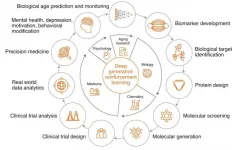Antibiotic may improve outcomes for depression in people with low level inflammation
Minocycline, a widely used antibiotic with anti-inflammatory properties, shows greater improvement in depressive symptoms in patients with treatment resistant depression with low-grade peripheral inflammation
2021-01-28
(Press-News.org) King's College London researchers have found evidence that minocycline, a widely used antibiotic with anti-inflammatory properties, gave greater improvement in depressive symptoms in patients with treatment resistant depression with low-grade peripheral inflammation.
Improvement in depressive symptoms
In a four-week randomised clinical MINDEP (MINocycline in DEPression) trial, 39 patients with major depressive disorder were recruited from services linked to South London and Maudsley NHS Foundation Trust (SLaM) and via public advertisement.
The trial took place at the NIHR / Wellcome Trust King's Clinical Research Facility at King's College Hospital. The patients, who were taking their routine antidepressant treatment, were split into two groups, one group took daily a placebo (sugar pill) tablet while the other group took daily minocycline alongside their routine treatment for 4 weeks.
Both groups showed similar, significant improvement in depressive symptoms as measured by the Hamilton Depression (HAM-D) Rating Scale. However, patients with higher C-reactive protein (CRP) levels, indicating low-grade inflammation, showed greater improvement in their depressive symptoms when taking minocycline.
Author Dr Valeria Mondelli, Clinical Reader in Psychoneuroimmunology at Institute of Psychiatry, Psychology & Neuroscience, King's College London, and Principal Investigator of the trial said: "Our findings are very exciting because we are showing that patients with increased levels of C reactive protein (an inflammatory biomarker) show a good response in terms of reduction of depressive symptoms following treatment with minocycline. Of the many patients with depression who do not respond to usual antidepressant treatment, we have shown in previous studies that in at least two thirds of patients this could be due to the increased levels of inflammation. Now, with this study, we are identifying a potential new effective treatment for these patients."
Predicting response
Patients underwent a blood sample to measure biological markers and a clinical assessment at the baseline visit and within 14 days the trial ending.
Researchers also found that levels of two biological markers, CRP and IL-6, can be used to predict minocycline response in depression. The study identified a specific threshold of CRP levels which is associated with the antidepressant effect of minocycline treatment. Another inflammatory marker, interferon-gamma, was reduced by the treatment with minocycline but not by placebo, suggesting specific pathways mediating the effects of minocycline on depressive symptoms.
Dr Mondelli added "We also identified the threshold of CRP levels that is associated with response to this anti-inflammatory treatment. This is very important as we may be able to identify with an easy blood test those patients who are going to benefit from treatment with an anti-inflammatory medication which is already used for other medical conditions and therefore easily available."
Dr Maria Antonietta Nettis, lead author and Clinical Research Associate at Institute of Psychiatry, Psychology & Neuroscience, King's College London said: "Integrating the measurement of biological markers such as CRP in patients' first assessments could help identifying potential responders to minocycline, which could be a relatively safe and well-tolerated addition to treatment in immune-related depression.
Although replications in larger samples are needed, we believe our study has a potentially important clinical impact, as we moved a step towards the identification of personalized treatments for Major depressive disorder (MDD)."
INFORMATION:
The National Institute for Health Research (NIHR) Maudsley Biomedical Research Centre (BRC) funded study was published today (TBC) in Neuropsychopharmacology.
Notes to editors
Contact
To receive a copy of the embargoed paper or to arrange interviews please contact the Communications team at NIHR Maudsley BRC:
Alex Booth, Communications and Engagement Manager, NIHR Maudsley Biomedical Research Centre, Tel 020 7848 0495 alex.booth@kcl.ac.uk
Serena Rianjongdee, Communications and Engagement Officer, NIHR Maudsley Biomedical Research Centre, Tel 020 7848 2137 serena.rianjongdee@kcl.ac.uk
The National Institute for Health Research (NIHR)
NIHR is the nation's largest funder of health and care research. The NIHR:
Funds, supports and delivers high quality research that benefits the NHS, public health and social care
Engages and involves patients, carers and the public in order to improve the reach, quality and impact of research
Attracts, trains and supports the best researchers to tackle the complex health and care challenges of the future
Invests in world-class infrastructure and a skilled delivery workforce to translate discoveries into improved treatments and services
Partners with other public funders, charities and industry to maximise the value of research to patients and the economy
The NIHR was established in 2006 to improve the health and wealth of the nation through research, and is funded by the Department of Health and Social Care. In addition to its national role, the NIHR supports applied health research for the direct and primary benefit of people in low- and middle-income countries, using UK aid from the UK government. http://www.nihr.ac.uk/
About King's College London and the Institute of Psychiatry, Psychology & Neuroscience
King's College London is one of the top 10 UK universities in the world (QS World University Rankings, 2020) and among the oldest in England. King's has more than 31,000 students (including more than 12,800 postgraduates) from some 150 countries worldwide, and some 8,500 staff.
The Institute of Psychiatry, Psychology & Neuroscience (IoPPN) at King's College London is the premier centre for mental health and related neurosciences research in Europe. It produces more highly cited outputs (top 1% citations) on mental health than any other centre (SciVal 2019) and on this metric we have risen from 16th (2014) to 4th (2019) in the world for highly cited neuroscience outputs. World-leading research from the IoPPN has made, and continues to make, an impact on how we understand, prevent and treat mental illness and other conditions that affect the brain.
http://www.kcl.ac.uk/ioppn @KingsIoPPN
ELSE PRESS RELEASES FROM THIS DATE:
2021-01-28
New research suggests that a higher dietary intake of long chain omega-3 fatty acids in childhood may reduce the risk of developing subsequent asthma, but only in children carrying a common gene variant. The study, led by Queen Mary University of London, is in collaboration with the University of Bristol and University of Southampton, UK, and Karolinska Institutet, Sweden.
In the UK, 1.1 million children (1 in 11) are currently receiving treatment for asthma and most adult asthma begins in childhood. The NHS spends around £1 billion a year treating and caring for people with asthma.
Senior author, Professor Seif Shaheen from Queen Mary ...
2021-01-28
Helping people to self isolate after testing positive for covid-19 must now be a top priority for the UK government, argue experts in The BMJ today.
Dr Muge Cevik at the University of St Andrews and colleagues say the focus should be on those working in high exposure occupations, living in overcrowded housing, or without a home, and should include free and safe accommodation alongside adequate income support, job protection, and help with caring responsibilities.
Most countries have used testing as a tool to interrupt transmission chains by encouraging ...
2021-01-28
Access to legal cannabis stores is associated with a reduction in opioid related deaths in the United States, particularly those linked to synthetic opioids such as fentanyl, finds a study published by The BMJ today.
Opioids are 'morphine-type' drugs that relieve short-term (acute) pain and pain at the end of life. There is little evidence that they are helpful for long-term (chronic) pain, but they are often prescribed for this reason.
This has led to widespread misuse and a sharp rise in overdose deaths, particularly in the United States. In 2018, there were more than 46,000 fentanyl related deaths, representing over two thirds of all US opioid related deaths that ...
2021-01-28
A new study has shown that, while there is limited evidence for overall increased mortality in patients with atopic eczema, those with severe atopic eczema may have a greater risk of dying from several health issues compared with those without eczema, according to a new study in the Journal of Allergy and Clinical Immunology.
The research team, led by the London School of Hygiene & Tropical Medicine (LSHTM) and funded by the Wellcome Trust, compared the risk of dying in over 500,000 adults with atopic eczema with more than 2.5 million without eczema. Patients with severe atopic eczema had a 62% higher risk of dying compared to ...
2021-01-28
27th of January, Wednesday, Hong Kong - Deep Longevity, a fully-owned subsidiary of Regent Pacific (HKEX: 0575), specializing in the development and the application of next-generation artificial intelligence (AI) for aging and longevity research, today announced the publication of an article in END ...
2021-01-27
The thought of eating insects is stomach turning for many, but new Edith Cowan University (ECU) research is shedding light on allergy causing proteins which could pose serious health risks for those suffering from shellfish allergy.
The research, published in the journal Food Chemistry, identified 20 proteins found in cricket food products which could cause serious allergic reactions.
The project was led by Professor Michelle Colgrave from ECU's School of Science and the CSIRO.
Professor Colgrave said crickets and other insects could be the key to feeding ...
2021-01-27
DALLAS (January 26, 2021) - Many people believe that they can't change their brains, or that their brain health will inevitably decline as they age. But the Strategic Memory Advanced Reasoning Tactics (SMART) training protocol, created by researchers and clinicians at the Center for BrainHealth®, has been demonstrated over the past two decades to improve cognitive function and psychological well-being in laboratory participants. Recent research suggests that SMART can even make long-lasting improvements to people's brain health when given outside of the lab in short, informal training sessions.
A paper detailing these findings was recently published in Military Medicine. The research was a collaboration between Leanne R. Young, PhD, of Applied Research Associates, ...
2021-01-27
The widespread use of cashless payments including credit cards, debit cards, and mobile apps has made transactions more convenient for consumers. However, results from previous research have shown that such cashless payments can increase consumers' spending on unhealthy food. "Why Do Cashless Payments Increase Unhealthy Consumption? The Decision-Risk Inattention Hypothesis," a newly published article in the Journal of the Association for Consumer Research, explains this phenomenon by showing how changes in bodily responses to cashless payments influence consumers responses.
Authors Joowon Park, Clarence Lee, and Manoj Thomas propose that cash and cashless payments elicit different levels of negative arousal when making shopping ...
2021-01-27
The development of small hydropower dams is widespread throughout Brazil and elsewhere in the world, vastly overshadowing large hydropower projects. The proliferation of these smaller dams is a response to growing energy and security needs. Their expansion, however, threatens many of the remaining free-flowing rivers and biodiverse tropical regions of the world -- interrupting the migrations of freshwater fishes, on which millions of peoples' livelihoods depend.
A new University of Washington paper published Jan. 11 in Nature Sustainability quantifies these tradeoffs between hydroelectric generation capacity and the impacts on river connectivity ...
2021-01-27
Popular folklore and anecdotal evidence suggest that people in a hypnotic or suggestible state can experience sensory hallucinations, such as perceiving sounds and sights that are not actually there. Reliable scientific evidence of these experiences, however, has been notoriously challenging to obtain because of their subjective nature.
New research published in the journal Psychological Science provides compelling evidence that hypnotic suggestions can help highly susceptible people "see" imaginary objects, equipping them with the missing details needed to solve an otherwise challenging visual puzzle.
"Hypnosis holds intriguing effects on human behavior," said Amir Raz, a researcher at McGill University and coauthor on the paper. "The careful, systematic study of hypnotic phenomena can ...
LAST 30 PRESS RELEASES:
[Press-News.org] Antibiotic may improve outcomes for depression in people with low level inflammation
Minocycline, a widely used antibiotic with anti-inflammatory properties, shows greater improvement in depressive symptoms in patients with treatment resistant depression with low-grade peripheral inflammation


